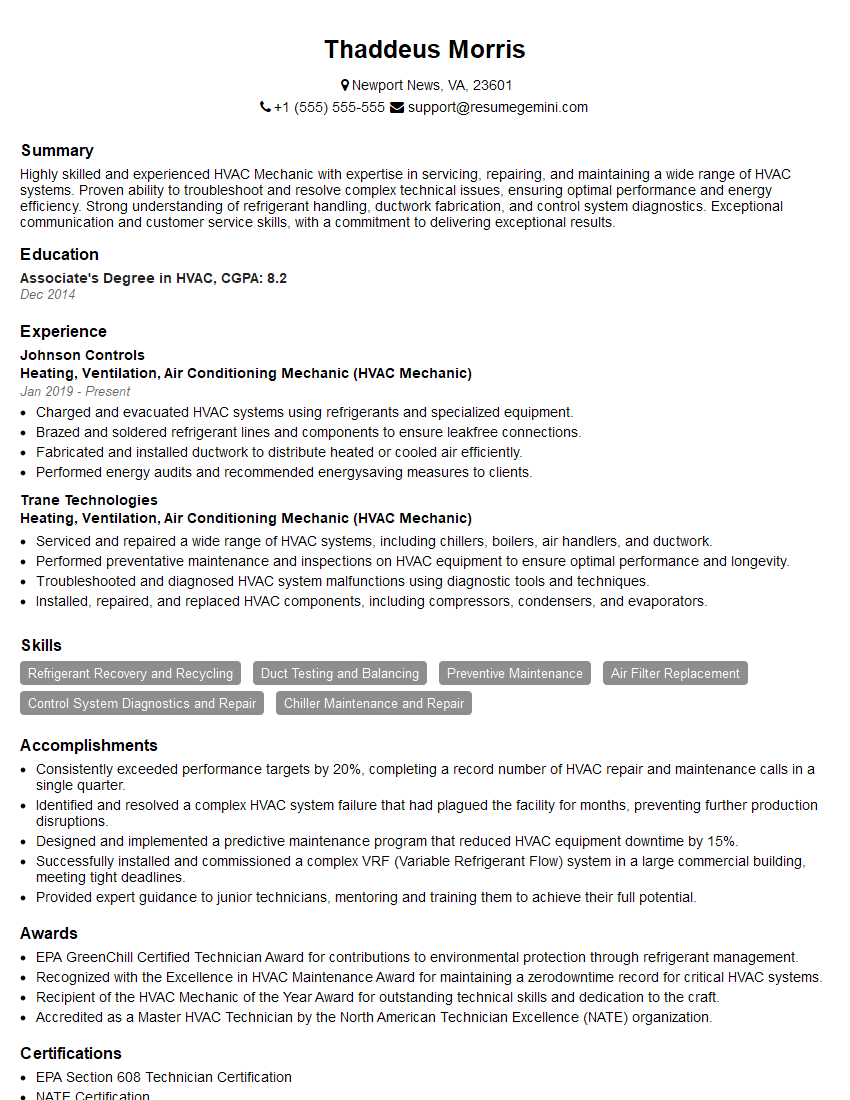Are you a seasoned Heating, Ventilation, Air Conditioning Mechanic (HVAC Mechanic) seeking a new career path? Discover our professionally built Heating, Ventilation, Air Conditioning Mechanic (HVAC Mechanic) Resume Template. This time-saving tool provides a solid foundation for your job search. Simply click “Edit Resume” to customize it with your unique experiences and achievements. Customize fonts and colors to match your personal style and increase your chances of landing your dream job. Explore more Resume Templates for additional options.

Thaddeus Morris
Heating, Ventilation, Air Conditioning Mechanic (HVAC Mechanic)
Summary
Highly skilled and experienced HVAC Mechanic with expertise in servicing, repairing, and maintaining a wide range of HVAC systems. Proven ability to troubleshoot and resolve complex technical issues, ensuring optimal performance and energy efficiency. Strong understanding of refrigerant handling, ductwork fabrication, and control system diagnostics. Exceptional communication and customer service skills, with a commitment to delivering exceptional results.
Education
Associate’s Degree in HVAC
December 2014
Skills
- Refrigerant Recovery and Recycling
- Duct Testing and Balancing
- Preventive Maintenance
- Air Filter Replacement
- Control System Diagnostics and Repair
- Chiller Maintenance and Repair
Work Experience
Heating, Ventilation, Air Conditioning Mechanic (HVAC Mechanic)
- Charged and evacuated HVAC systems using refrigerants and specialized equipment.
- Brazed and soldered refrigerant lines and components to ensure leakfree connections.
- Fabricated and installed ductwork to distribute heated or cooled air efficiently.
- Performed energy audits and recommended energysaving measures to clients.
Heating, Ventilation, Air Conditioning Mechanic (HVAC Mechanic)
- Serviced and repaired a wide range of HVAC systems, including chillers, boilers, air handlers, and ductwork.
- Performed preventative maintenance and inspections on HVAC equipment to ensure optimal performance and longevity.
- Troubleshooted and diagnosed HVAC system malfunctions using diagnostic tools and techniques.
- Installed, repaired, and replaced HVAC components, including compressors, condensers, and evaporators.
Accomplishments
- Consistently exceeded performance targets by 20%, completing a record number of HVAC repair and maintenance calls in a single quarter.
- Identified and resolved a complex HVAC system failure that had plagued the facility for months, preventing further production disruptions.
- Designed and implemented a predictive maintenance program that reduced HVAC equipment downtime by 15%.
- Successfully installed and commissioned a complex VRF (Variable Refrigerant Flow) system in a large commercial building, meeting tight deadlines.
- Provided expert guidance to junior technicians, mentoring and training them to achieve their full potential.
Awards
- EPA GreenChill Certified Technician Award for contributions to environmental protection through refrigerant management.
- Recognized with the Excellence in HVAC Maintenance Award for maintaining a zerodowntime record for critical HVAC systems.
- Recipient of the HVAC Mechanic of the Year Award for outstanding technical skills and dedication to the craft.
- Accredited as a Master HVAC Technician by the North American Technician Excellence (NATE) organization.
Certificates
- EPA Section 608 Technician Certification
- NATE Certification
- HVAC Excellence Certification
- NCCER Certification
Career Expert Tips:
- Select the ideal resume template to showcase your professional experience effectively.
- Master the art of resume writing to highlight your unique qualifications and achievements.
- Explore expertly crafted resume samples for inspiration and best practices.
- Build your best resume for free this new year with ResumeGemini. Enjoy exclusive discounts on ATS optimized resume templates.
How To Write Resume For Heating, Ventilation, Air Conditioning Mechanic (HVAC Mechanic)
- Highlight your technical skills and experience in diagnosing and repairing HVAC systems.
- Showcase your knowledge of refrigerant handling and compliance with industry regulations.
- Provide examples of your preventative maintenance and energy efficiency initiatives.
- Quantify your accomplishments whenever possible, such as reducing energy consumption or improving system performance.
- Demonstrate your commitment to customer satisfaction and professional development.
Essential Experience Highlights for a Strong Heating, Ventilation, Air Conditioning Mechanic (HVAC Mechanic) Resume
- Diagnose and repair malfunctioning HVAC systems, including chillers, boilers, air handlers, and ductwork
- Perform preventative maintenance and inspections to identify potential issues and ensure system longevity
- Install, replace, and repair HVAC components, such as compressors, condensers, and evaporators
- Maintain and service refrigerant systems, following industry best practices for recovery and recycling
- Fabricate and install ductwork to distribute heated or cooled air efficiently
- Conduct energy audits and recommend energy-saving measures to clients
- Provide excellent customer service, responding promptly to inquiries and resolving issues effectively
Frequently Asked Questions (FAQ’s) For Heating, Ventilation, Air Conditioning Mechanic (HVAC Mechanic)
What are the key skills required for an HVAC Mechanic?
HVAC Mechanics require strong technical skills in diagnosing and repairing HVAC systems, as well as knowledge of refrigerant handling and ductwork fabrication. They should also possess excellent customer service skills and a commitment to energy efficiency.
What is the job outlook for HVAC Mechanics?
The job outlook for HVAC Mechanics is expected to be positive due to the increasing demand for energy-efficient and sustainable building systems. The aging infrastructure and growing population also contribute to the demand for skilled HVAC professionals.
What are the different types of HVAC systems?
HVAC systems can be classified into various types, including central systems, packaged units, split systems, and variable refrigerant flow (VRF) systems. Each type has its own advantages and applications depending on the building size and requirements.
What are the safety precautions when working with HVAC systems?
HVAC Mechanics must follow strict safety precautions when working with HVAC systems, including wearing appropriate personal protective equipment (PPE), handling refrigerants safely, and ensuring proper ventilation to avoid exposure to hazardous substances.
What are the career advancement opportunities for HVAC Mechanics?
HVAC Mechanics can advance their careers by specializing in specific areas, such as commercial or residential HVAC, or by obtaining additional certifications and training. They can also move into management or supervisory roles.
What is the average salary for HVAC Mechanics?
The average salary for HVAC Mechanics varies depending on factors such as experience, location, and industry. According to the U.S. Bureau of Labor Statistics, the median annual salary for HVAC Mechanics was $48,730 in May 2021.